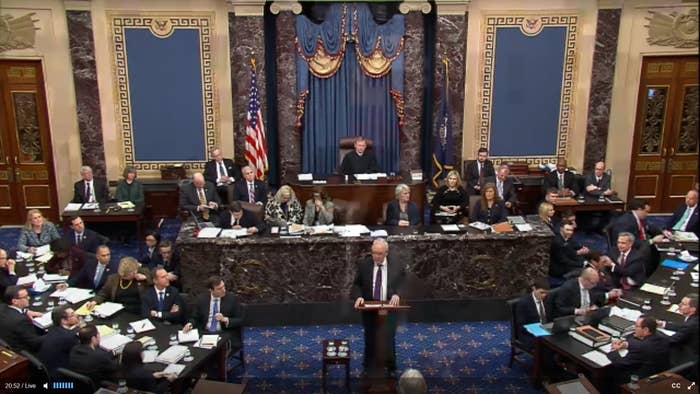
After eight days of marathon sessions in the US Senate, impeachment managers and the president's attorneys have made their cases for and against the impeachment of President Donald J. Trump.
Democrats laid out their argument against the 45th president, presenting communications between US diplomats, video of press conferences, and testimony that Trump withheld military aid from Ukraine as the president and his allies sought the country's help in targeting one of Trump's political opponents.
The president's attorneys, meanwhile, argued Trump didn't do anything wrong — and even if he did, it wasn't enough to be impeached.
What is this about, again?
President Trump faces two articles of impeachment against him: abuse of power and obstruction of Congress.
The case against him erupted over a phone call with Ukrainian President Volodymyr Zelensky in July, but the case extends months before that as Trump and his allies allegedly attempt to get the country to investigate former vice president Joe Biden and his son, using millions of dollars in aid as leverage.
Here, after hours of legal arguments before the Senate, are the major arguments and evidence presented in the impeachment trial:
Trump's administration offered Ukraine a White House meeting in exchange for an investigation into energy company Burisma and the Bidens, an ambassador said.
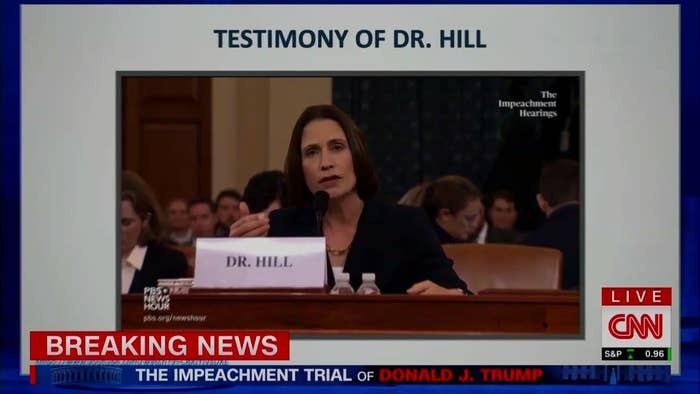
In a July 10 meeting between US and Ukrainian officials in DC, multiple people testified that Gordon Sondland, ambassador to the European Union, mentioned the prospect of a presidential meeting at the Oval Office if Ukraine announced an investigation into Burisma, a Ukrainian energy company.
It was clear that meant also investigating Trump's political rival, Joe Biden, whose son Hunter Biden sat on Burisma's board, one attendee said. Rudy Giuliani, a lawyer for Trump, had been speaking publicly about the Bidens and Burisma for months.
Former National Security Council official Fiona Hill: "And so when I came in, Gordon Sondland was basically saying, 'Well look, we have a deal here that there will be a meeting. I have a deal here with [acting] Chief of Staff [Mick] Mulvaney, there will be a meeting if the Ukrainians open up or announce these investigations into 2016 and Burisma.' And I cut it off immediately there because by this point having heard Mr. Giuliani over and over again on the television and all of the issues that he was asserting, by this time it was clear that Burisma was code for the Bidens."
The comment from Sondland was so alarming, Hill testified, that then–national security adviser John Bolton told Hill to brief the National Security Council's top attorney about the exchange.
Trump's special envoy to Ukraine said it was critical for Ukraine's president to support the investigation.
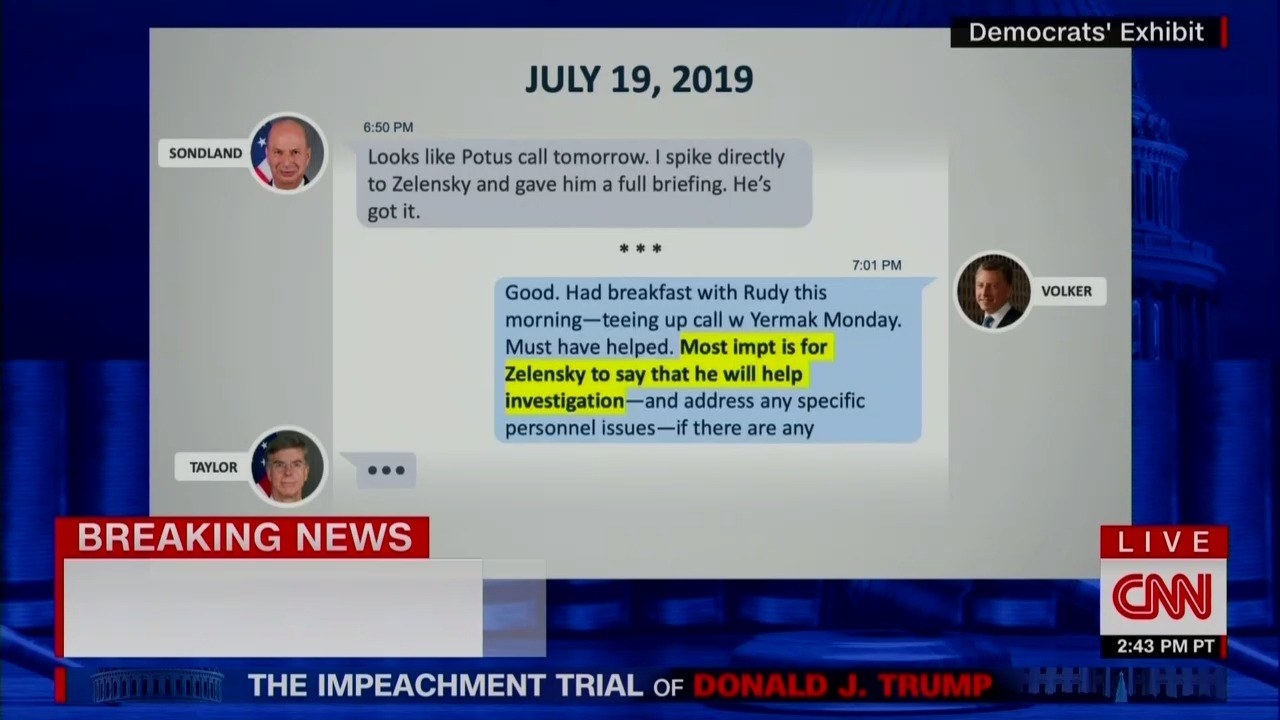
The House obtained text and WhatsApp messages between Sondland, special envoy to Ukraine Kurt Volker, and then–acting ambassador to Ukraine Bill Taylor from July 2019 in which they discussed getting Zelensky to announce Trump's investigations in exchange for a meeting with Trump.
Sondland: "Looks like Potus call tomorrow. I spoke directly with Zelensky and gave him a full briefing. He's got it."
Volker: "Good. Had breakfast with Rudy this morning—teeing up call w [Zelensky adviser Andriy] Yermak Monday. Must have helped. Most impt is for Zelensky to say that he will help investigation—and address any specific personnel issues—if there are any."
Ukraine's president was concerned the investigation put his country in the middle of domestic US politics, a US ambassador said.
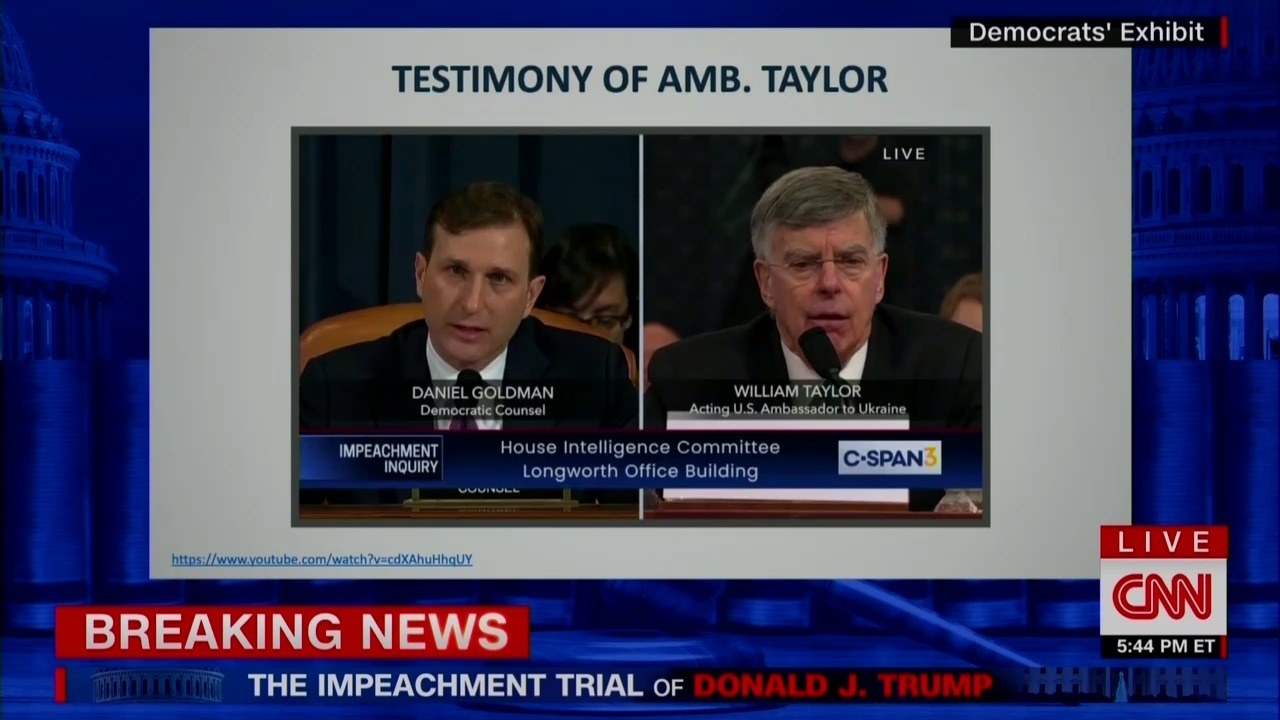
Bill Taylor testified that on July 20 he spoke with Zelensky's national security adviser, who relayed concerns that the Ukrainian president "did not want to become an instrument in US politics."
Taylor: "[Ukrainian official Oleksandr] Danyliuk understood that these investigations were pursuant to Mr. Giuliani's request to develop information, to find information, about Burisma and the Bidens. This was very well known in public. Mr. Giuliani had made this point clear in several instances in the beginning, in springtime. And Mr. Danyliuk understood that to be problem [...] Mr. Danyliuk indicated that President Zelensky certainly understood it. That he did not want to get involved in these type of activities."
Taylor also relayed this concern to Sondland in texts.
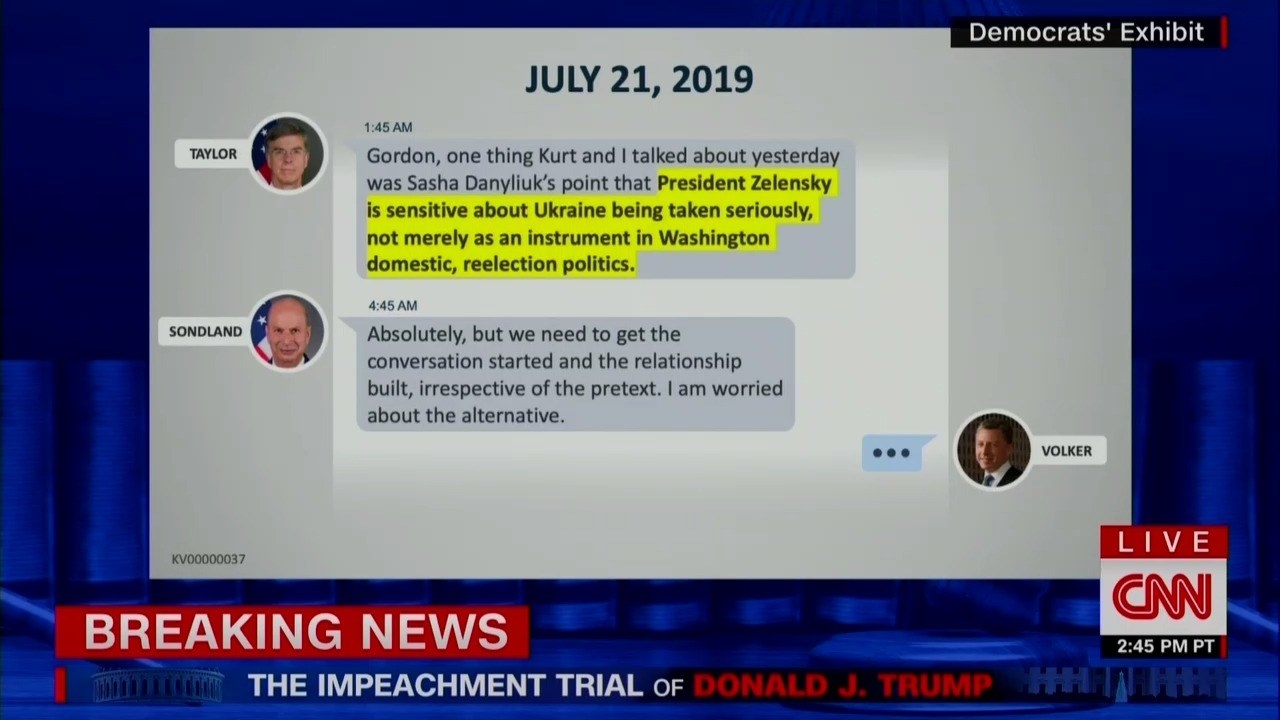
Taylor: "Gordon, one thing Kurt [Volker] and I talked about yesterday was ... Danyliuk's point that President Zelensky is sensitive about Ukraine being taken seriously, not merely as an instrument in Washington domestic, reelection politics."
Thirty minutes before Trump's July 25 call with Zelensky, Volker texted a Ukrainian official that the investigations were key to arrange a White House visit.
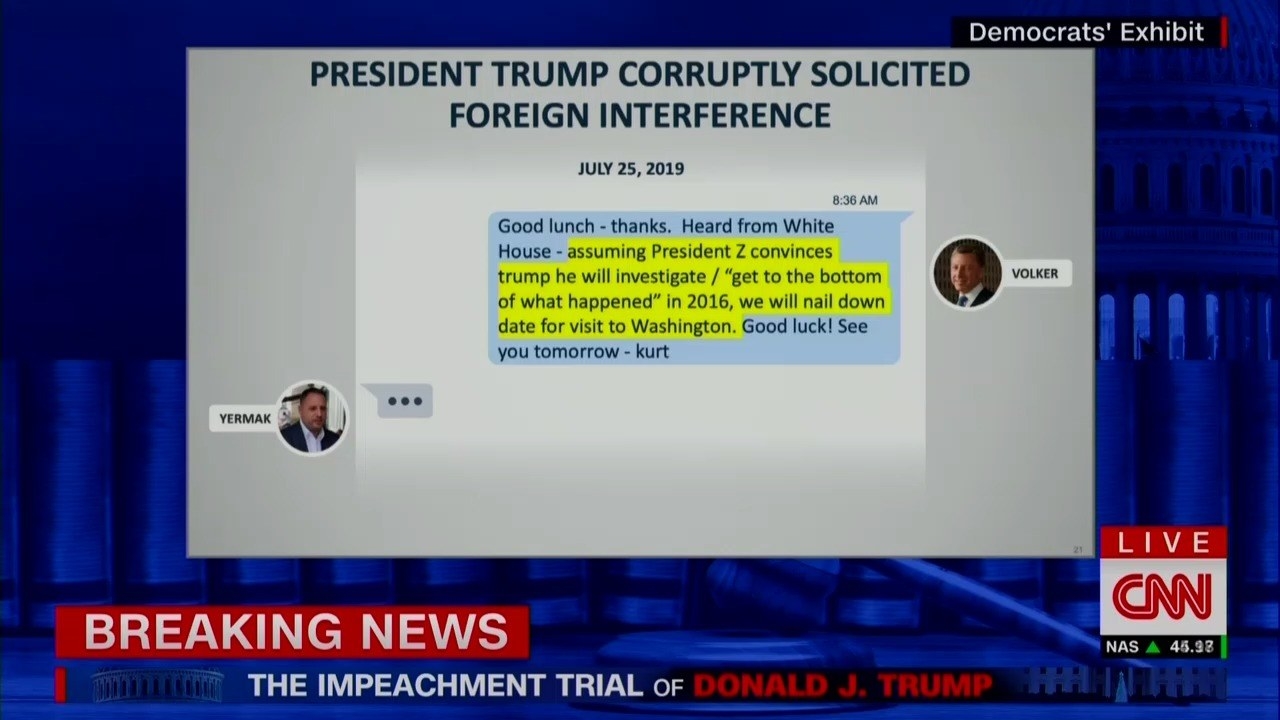
According to one text, Volker reminded one of Zelensky's advisers, Andriy Yermak, that Zelensky should convince Trump he would launch the investigation.
Volker, to Yermak: "Good lunch - thanks - Heard from White House - assuming President Z convinces trump he will investigate / 'get to the bottom of what happened' in 2016, we will nail down date for visit to Washington. Good luck! See you tomorrow - kurt."
In the phone call, Trump told Zelensky to "do us a favor" and investigate a company the Democratic National Committee hired in 2016, Hunter Biden, and Joe Biden.
For both Democrats and Republicans, the July 25 phone call between President Trump and President Zelensky is the crux of their arguments.
Democrats point to Trump directly asking Zelensky to "find out what happened with this whole situation with Ukraine, they say CrowdStrike," referencing a company the Democratic National Committee hired in 2016 to help investigate the Russian hacking of its servers. On the call, Trump also explicitly asked Zelensky to "look into" Biden and his son.
President Trump: "I would like you to do us a favor though because our country has been through a lot and Ukraine knows a lot about it. I would like you to find out what happened with this whole situation with Ukraine, they say CrowdStrike... I guess you have one of your wealthy people... The server, they say Ukraine has it [...] The other thing, there's a lot of talk about Biden's son, that Biden stopped the prosecution and a lot of people want to find out about that so whatever you can do with the Attorney General would be great. Biden went around bragging that he stopped the prosecution so if you can look into it... It sounds horrible to me."
Trump's comments seem to reference a debunked theory that Democrats used CrowdStrike to fake the hacking of their server before the 2016 election in order to accuse Russia of interfering in the election and damage Trump. US intelligence agencies all concur that Russia, not Ukraine, interfered in the election.
Trump's attorneys argued the transcript showed that Trump was concerned about overall corruption in Ukraine and that the lack of a mention of the military aid money or direct mention of a quid pro quo in the phone call means Ukraine was never pressured to announce investigations into the Bidens.
Multiple US officials who testified before the House said that the military aid and alliance with the US is so crucial to Ukraine that it is an unspoken context to any conversation between the two countries.
Ninety minutes after the phone call, the Defense Department was told to hold off on military aid to Ukraine.
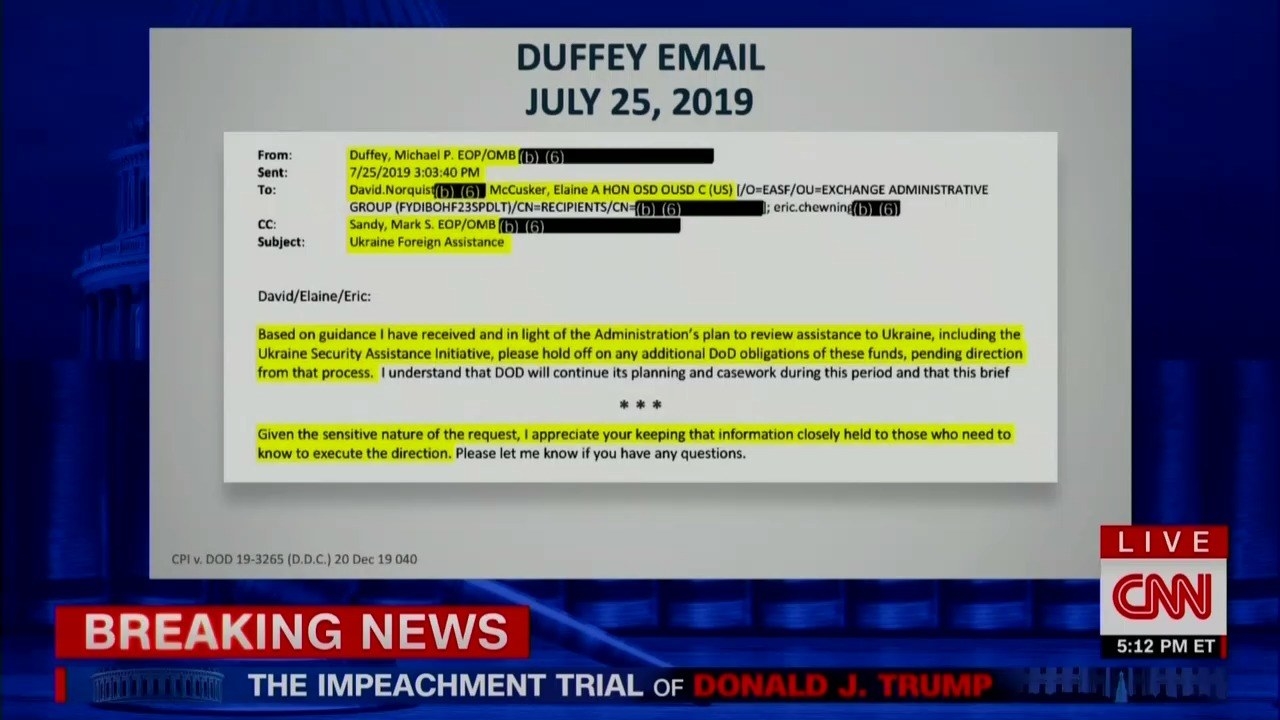
An Office of Management and Budget official, Michael Duffey, sent an email on July 25, about 90 minutes after Trump's call with Zelensky, alerting them that nearly $400 million in military aid to Ukraine was on hold.
Duffey: "Based on guidance i've received and in light of the administration's plan to review assistance to Ukraine, please hold off in any additional DOD obligations of these funds pending direction from that process [...] given the sensitive nature o the request, I appreciate you keeping that information closely held to those who need to know to execute the direction."
Trump's attorneys argued that the president was concerned about corruption in Ukraine, suggesting that was the reason aid was held up. Foreign aid to other countries, including Afghanistan, El Salvador, and Honduras, they said, has also been paused or canceled by the administration, though House Democrats pointed out that foreign aid holds — including by the Trump administration — are typically announced publicly.
The day after the phone call, Trump was overheard personally asking if Ukraine was going to follow through on investigations, an embassy worker said.
David Holmes, counselor of political affairs at the US Embassy in Ukraine, testified he overheard a phone call between Sondland and Trump.
Holmes: "Ambassador Sondland replied yes, he was in Ukraine, and went on to state that President Zelensky quote, 'loves your ass.' I then heard President Trump ask, 'So he's going to do the investigation?' Ambassador Sondland replied that, 'He's going to do it,' adding that, 'President Zelensky will do anything you ask him to do.'"
But Trump's attorneys said the Bidens deserved to be investigated for corruption.
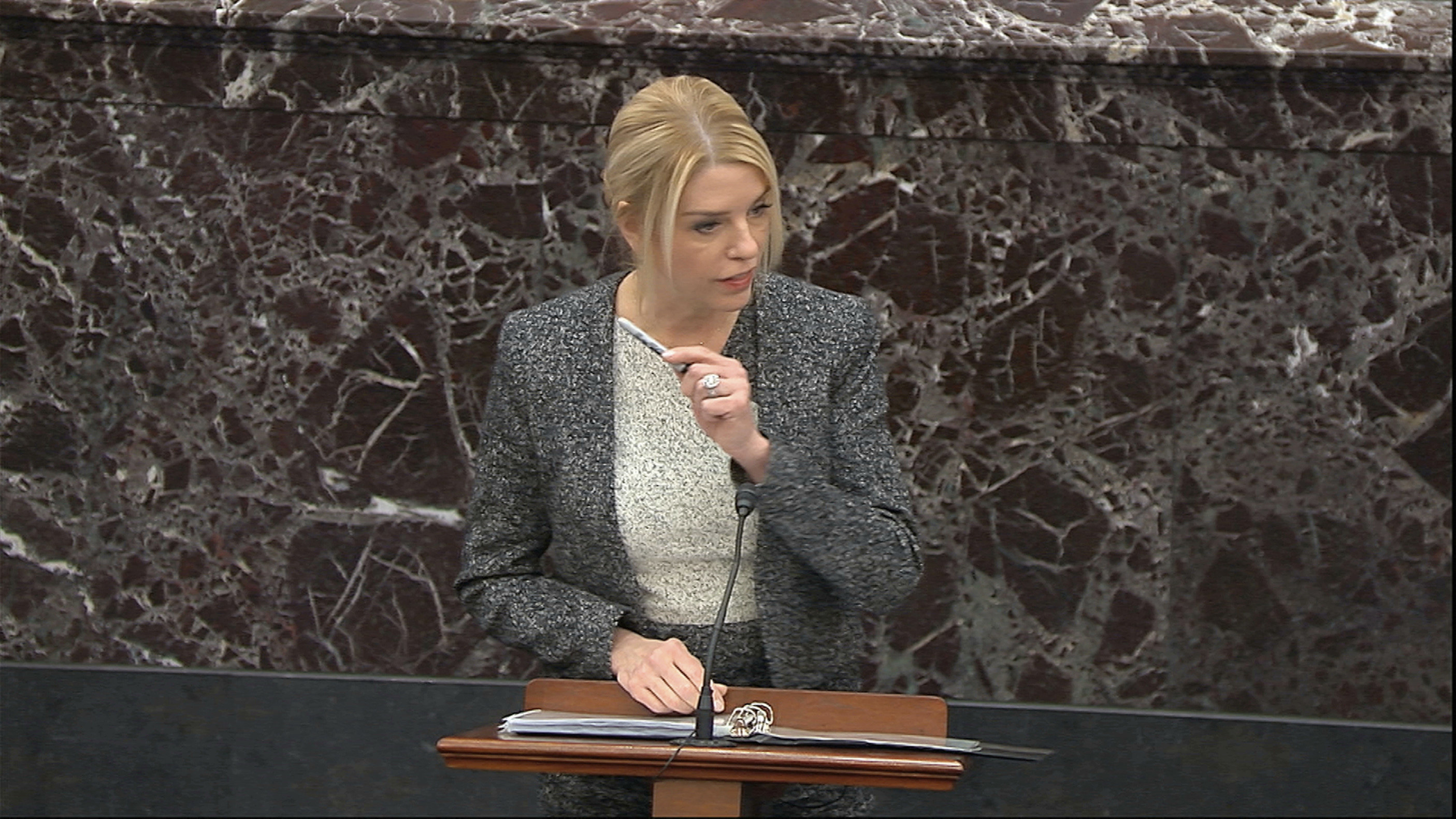
Former Florida attorney general Pam Bondi implied Joe Biden forced Ukraine to fire a Ukrainian prosecutor investigating Burisma, the energy company tied to his son, Hunter Biden.
Democrats, however, argued that the removal of the prosecutor, Viktor Shokin, was widely considered to be corrupt and removed in accordance with US policy and after prompting from many other western nations as well. Shokin also was no longer investigating Burisma at the time he was ousted.
Rep. Jerry Nadler: "It is true that Vice President Biden helped remove Mr. Shokin who is widely believed to be corrupt. And I said a few minutes ago, it was official policy of the United States, the European community and others, in order to fight corruption in Ukraine, to ask that Shokin and [then–Ukrainian prosecutor general Yuriy] Lutsenko be removed. So Vice President Biden, in fulfilling the US policy, pressured Ukraine to remove Shokin. Not to secure some personal benefit, but to advance the policy of the United States and its allies."
Ukraine's president later said, "Nobody pushed me."
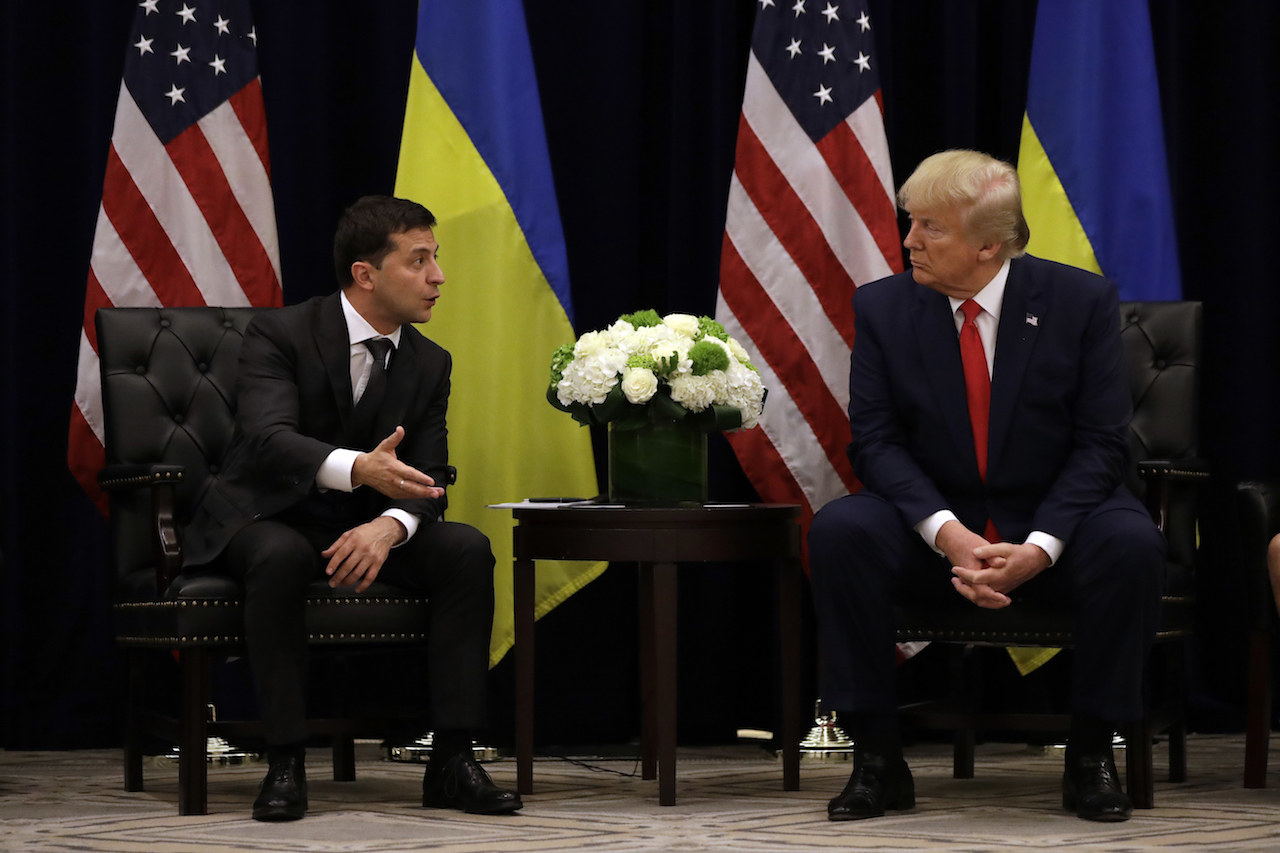
President Trump's attorneys largely ignored the text messages and emails between US officials discussing Ukraine and Trump's effort to get Zelensky to announce investigations into Burisma.
Instead, they pointed to Zelensky's response when asked about the controversial phone call on Sept. 25, when he sat down with Trump in New York ahead of a United Nations General Assembly meeting.
"I think we had a good phone call, it was normal," Zelensky told reporters, with Trump sitting next to him. "Nobody pushed me."
Giuliani said that Trump himself wanted Zelensky to make a public statement about an investigation into the 2016 election, the DNC server, and Burisma, Sondland testified.
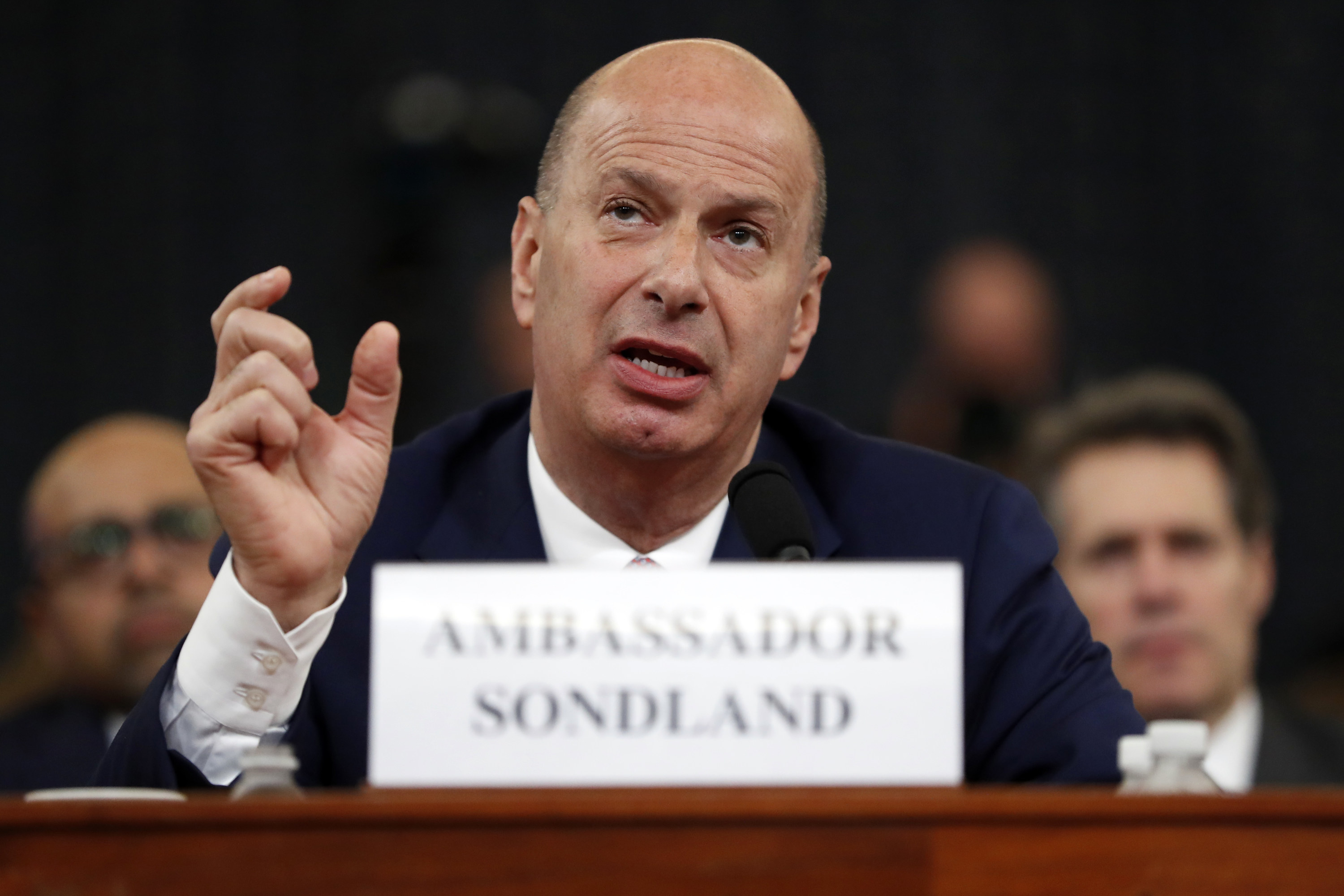
Sondland, testifying in a public House hearing on impeachment: "I first communicated with Mr. Giuliani in early August, several months later. Mr. Giuliani emphasized that the president wanted a public statement from President Zelensky committing Ukraine to look into the corruption issues. Mr. Giuliani specifically mentioned the 2016 election, including the DNC server and Burisma as two topics of importance to the President."
Sondland also testified that it had become clear to officials that Giuliani was speaking for Trump.
Sondland: "I know that members of this committee frequently frame these complicated issues in the form of a simple question. Was there a quid pro quo? As I testified previously with regard to the requested White House call and the White House meeting, the answer is yes. Mr. Giuliani conveyed to [Energy] Secretary [Rick] Perry, Ambassador Volker and others that President Trump wanted a public statement from President Zelensky committing to investigations of Burisma and the 2016 election."
Zelensky's top adviser wanted a firm date for the promised White House visit before any formal statement on the investigations was made.
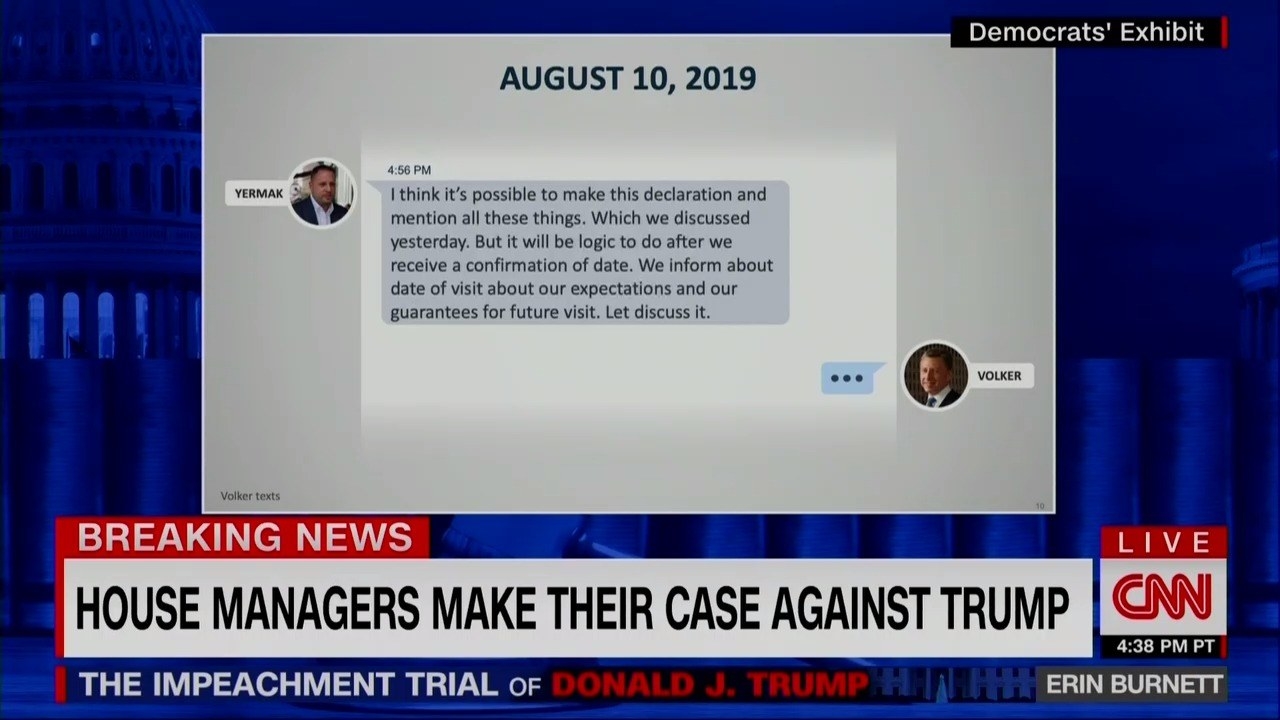
Yermak, Zelensky's adviser, was also in contact with State Department officials and underlined in text messages that a White House visit had been promised.
Yermak to Volker: "I think it's possible to make this declaration and mention all these things. Which we discussed yesterday. But will be logic[al] to do after we receive a confirmation of date. We inform about date of visit about our expectations and our guarantees for future visit. Let discuss it."
Those investigations, according to texts, included Burisma and meddling in the 2016 election.
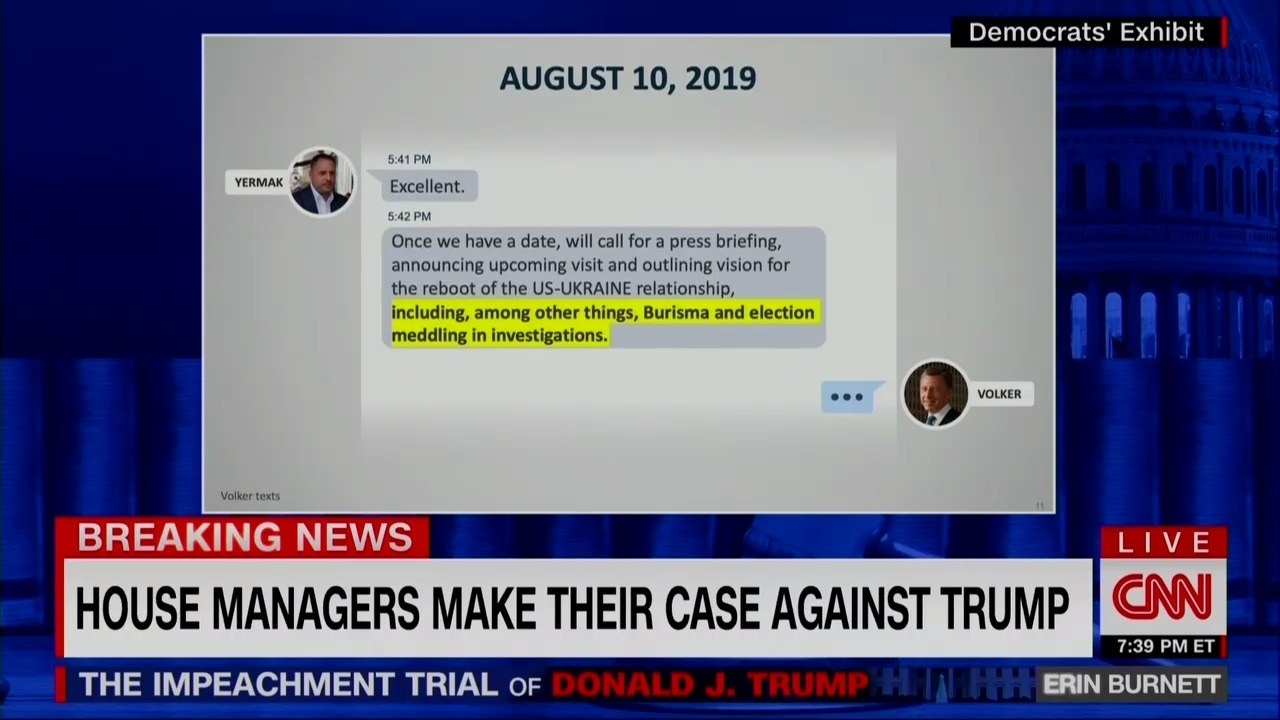
Yermak, in a message to Volker: "Once we have a date, will call for a press briefing announcing upcoming visit and outlining vision for the reboot of US-UKRAINE relationship, including, among other things, Burisma and election meddling in investigations."
Giuliani, Volker, and Sondland edited the Ukrainian statement to specifically mention the 2016 election and Burisma.
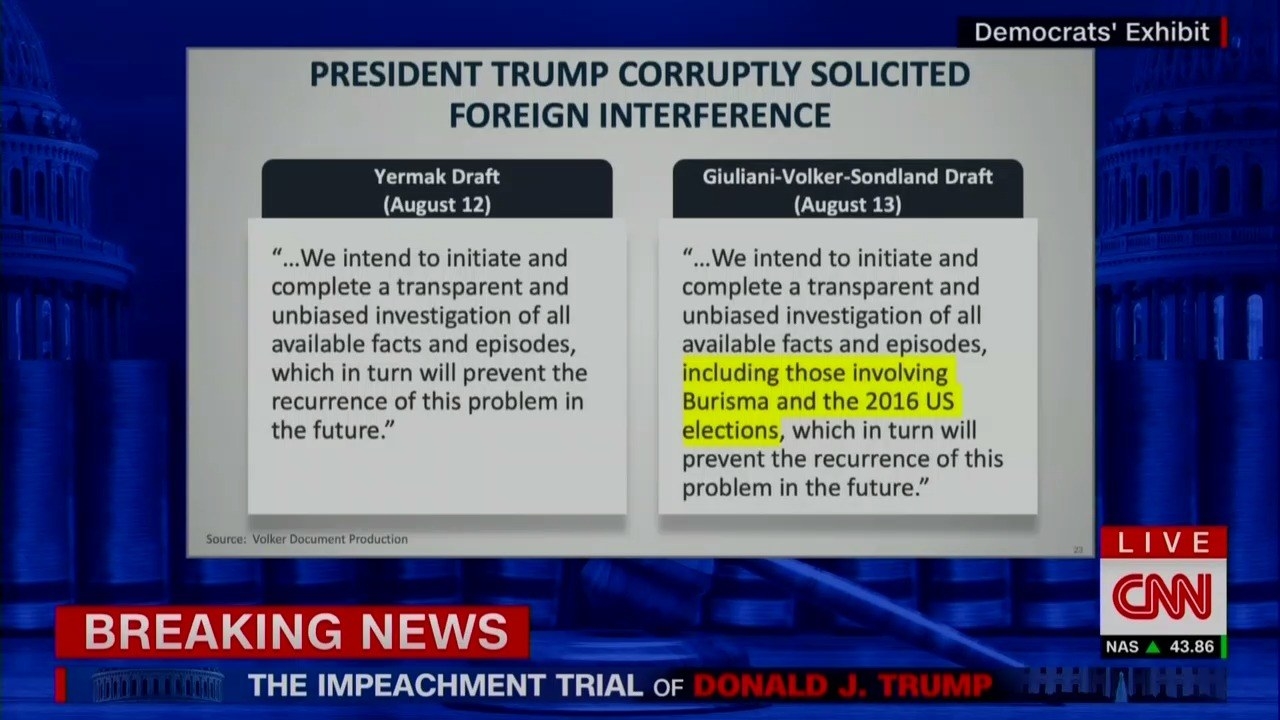
By Aug. 12, Ukrainian officials had a draft statement ready to share with US officials announcing their investigations. But officials testified that Volker, Giuliani, and Sondland offered specific edits to the statement — including specifically mentioned the 2016 election and Burisma.
Taylor testified that Sondland said Trump told him everything — a White House visit as well as military aid — depended on Ukraine announcing its investigation into Burisma and the 2016 election.
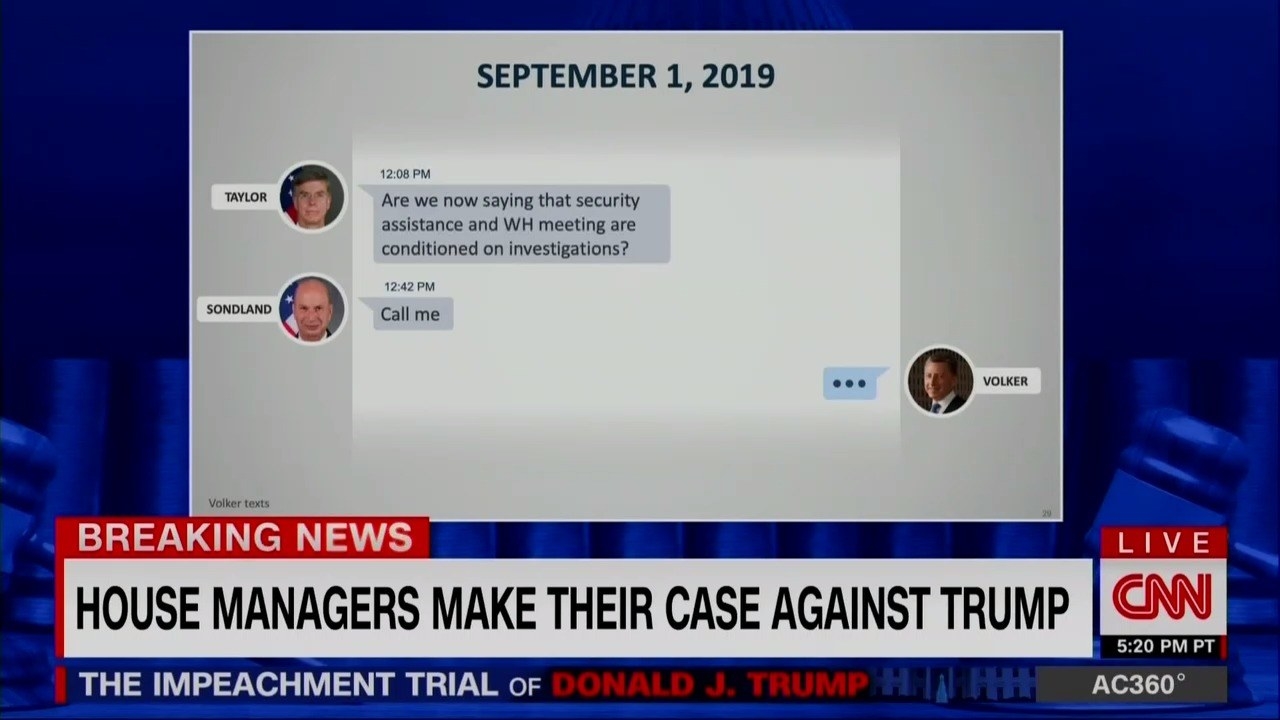
By September, Taylor testified, he had become aware that US military aid to Ukraine was being tied to Ukraine announcing investigations.
Taylor: "During that phone call, Ambassador Sondland told me that President Trump had told him that he wants President Zelensky to state publicly that Ukraine will investigate Burisma, and alleged Ukrainian interference in the 2016 election. Ambassador Sondland also told me that he now recognized that he had made a mistake by earlier telling Ukrainian officials that only a White House meeting with President Zelensky was dependent on an announcement of the investigations. In fact, Ambassador Sondland said everything was dependent on such an announcement, including security assistance. He said that President Trump wanted President Zelensky in a public box."
On Aug. 28, Politico broke the news that the military aid was on hold. A week later, the scheme to tie the military aid to the Biden investigation requested by the White House became public. On Sept. 5, the Washington Post ran an editorial reporting that the military aid had been halted in an effort to get Ukraine to meddle in the 2020 election.
Trump then said he didn't want any quid pro quo from Zelensky.
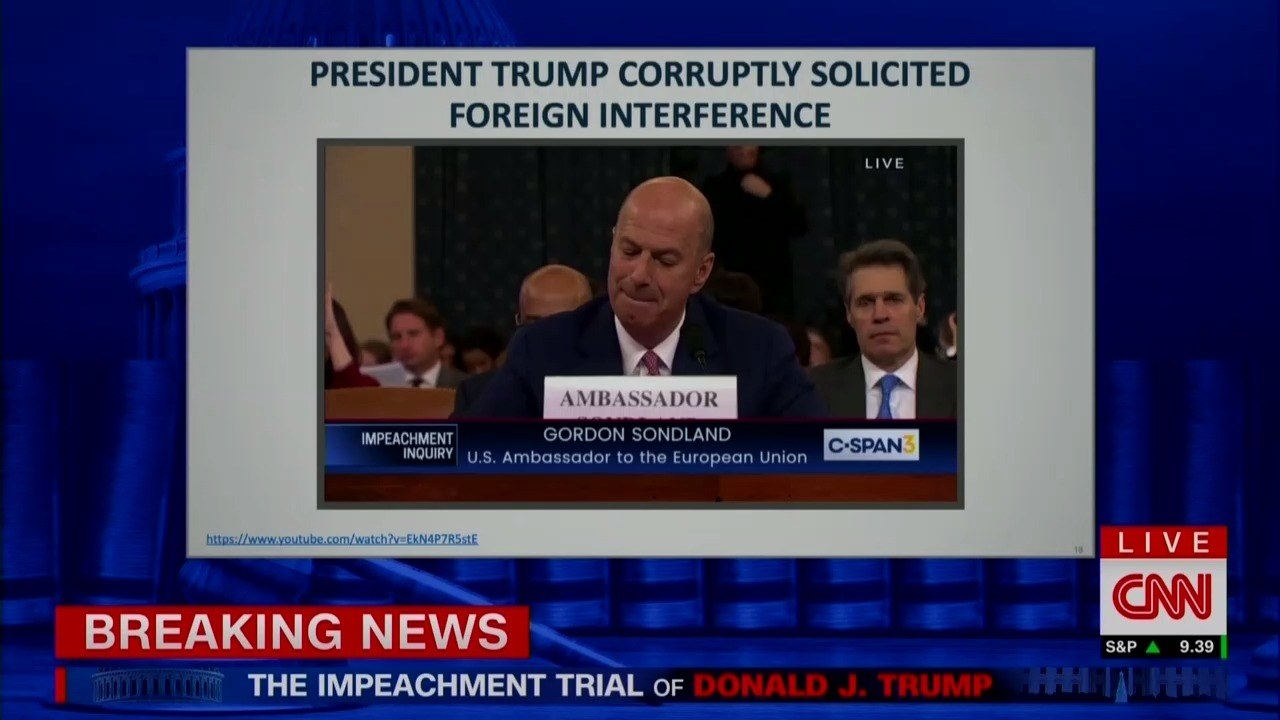
"I want nothing. I want nothing. I want no quid pro quo. Tell Zelensky to do the right thing," Sondland said Trump told him on Sept. 7.
Republicans have pointed to that statement as proof that the president was not looking for a quid pro quo. But Democrats pointed out that at the time the conversation took place, Trump knew a whistleblower complaint had been filed regarding his call with Zelensky and the investigation request.
"At that point, he is aware that a whistleblower has filed a complaint alleging the contours of this scheme, and Congress and the public are beginning to ask questions about the hold on aid, including whether this was to get help in his reelection," said Rep. Adam Schiff, the lead House impeachment manager. "That's the type of thing that comes up if you're trying to put your alibi out there."
Trump told reporters in October he thought Ukraine and China should start a "major investigation" into the Bidens.
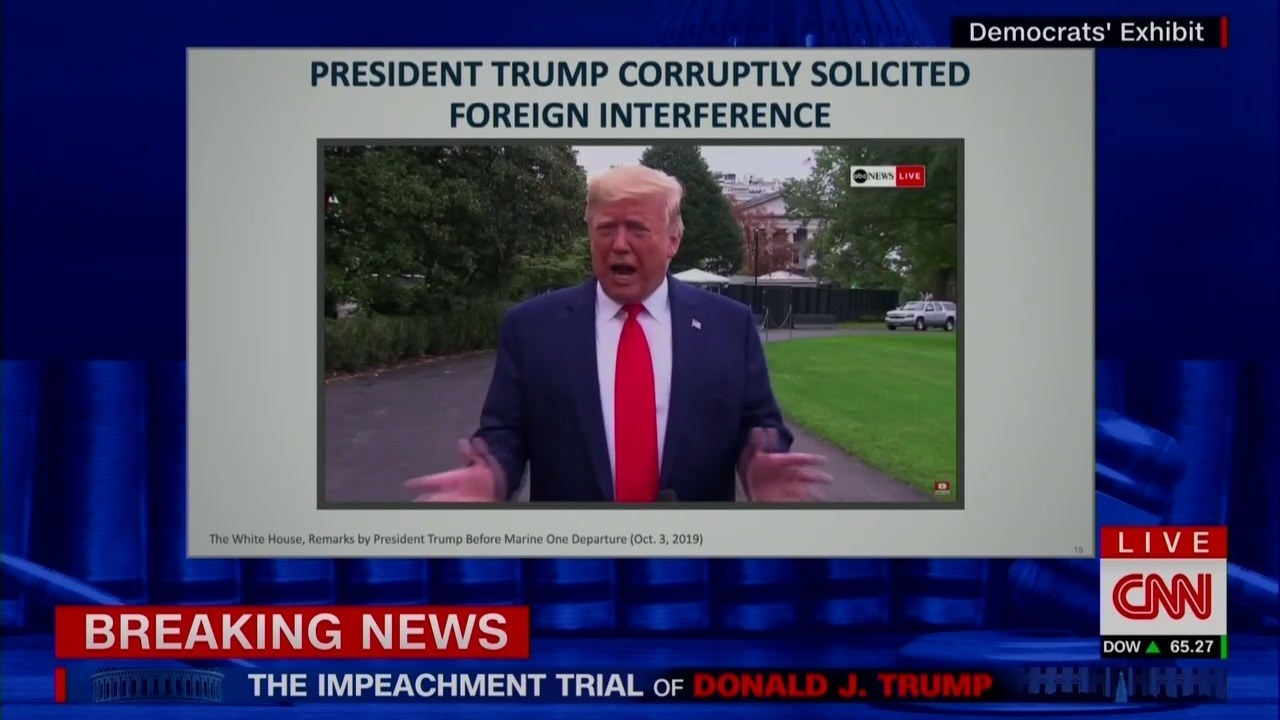
President Trump, Oct. 3: "I would think that if they were honest about it, [Ukraine] would start a major investigation into the Bidens. It's a very simple answer. They should investigate the Bidens, because how does a company that's newly formed and all these companies if you look at — and by the way, likewise, China should start an investigation into the Bidens because what happened in China is just about as bad as what happened with Ukraine."
And Trump previously said he'd accept foreign help if it would win him reelection.
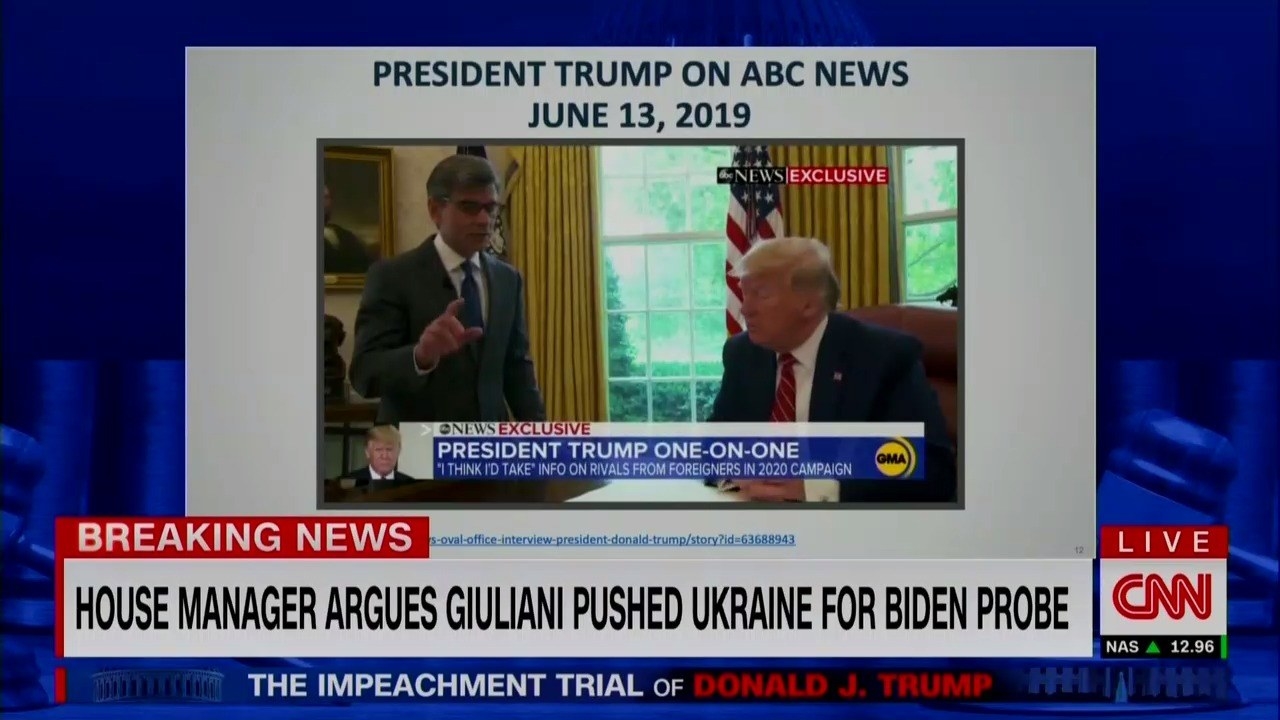
In an interview on June 13, Trump once again aired his willingness to receive foreign help if it meant getting an edge in his reelection bid.
Asked if he would accept information on a political opponent from a foreign power, he said he would.
Trump: "I think maybe you do both. I think you might want to listen. There's nothing wrong with listening. If somebody called from a country, Norway, 'We have information on your opponent.' I think that I'd want to hear it."
Trump's lawyers also argued before the Senate that accepting dirt on a political opponent from a foreign country was not impeachable.
Trump's acting chief of staff said military aid to Ukraine was indeed held up in connection to investigations into corruption, the DNC server, and the 2016 election.
Acting chief of staff Mick Mulvaney: "Did he also mention to me in past the corruption related to the DNC server? Absolutely. No question about that. And That's why we held up the money. [...] The look back to what happened in 2016 certainly was part of the thing that he was worried in corruption with that nation and that is absolutely appropriate."
Reporter: "Let's be clear, what you just described is a quid pro quo. It is funding will not flow unless the investigation into the Democratic server happened as well."
Mulvaney: "We do that all the time with foreign policy."
Even if Trump had withheld the aid from Ukraine in exchange for help in the 2020 election, it didn't merit impeachment, his lawyer said.
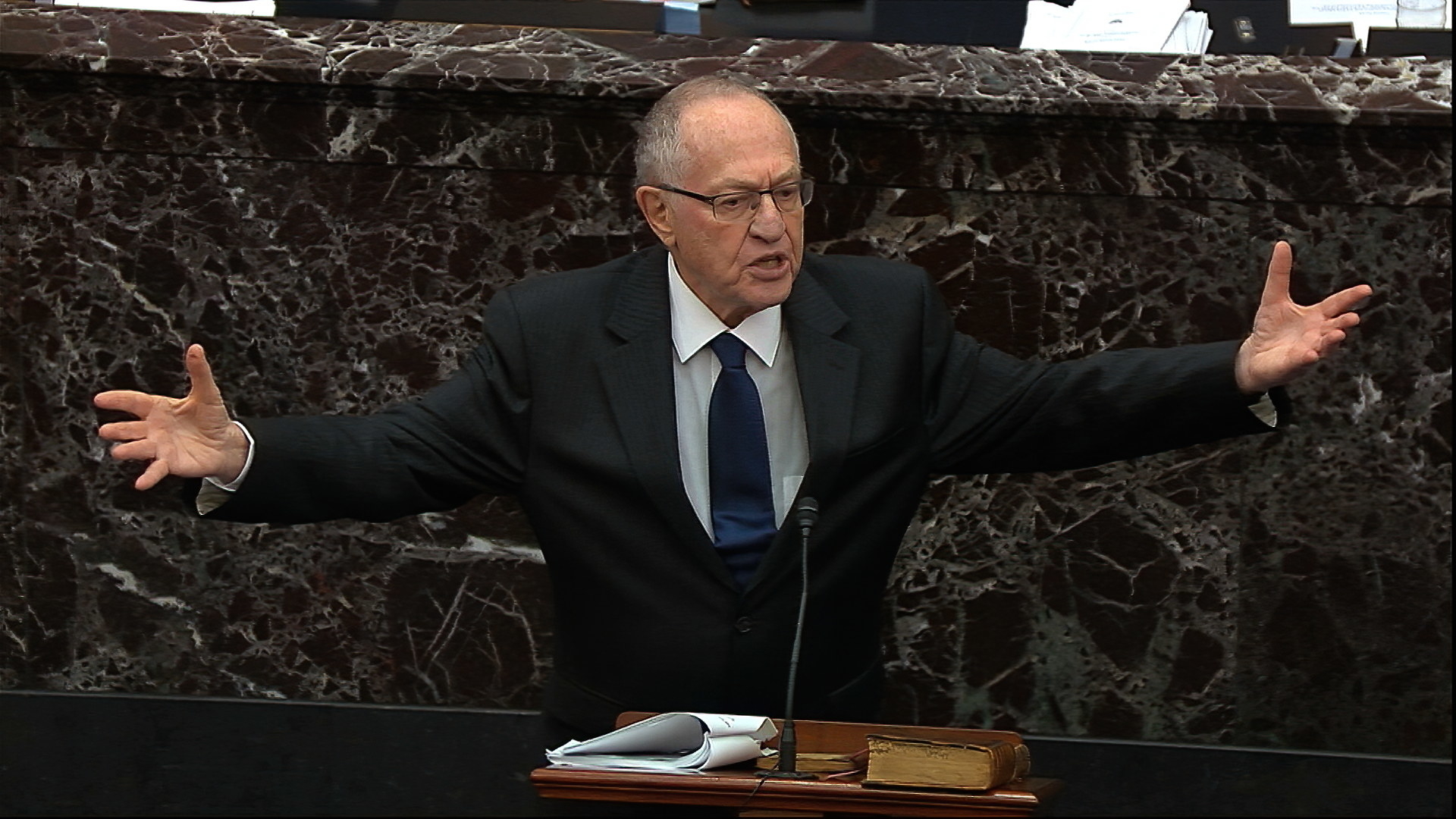
Instead of addressing the correspondence and evidence presented by Democrats, the president's attorneys spent much of their time arguing about the process of the impeachment hearing.
Even if Trump had withheld hundreds of millions of dollars in defense aid to Ukraine in exchange for help in the 2020 election, lawyer Alan Dershowitz argued, it still wouldn't merit the removal of a president.
A president could only be impeached for actual crimes in the criminal code, Dershowitz argued — contradicting his stance during former president Bill Clinton's impeachment trial. At that time, Dershowitz said a president didn't need to commit a crime to be impeached.
Dershowitz: "You cannot turn conduct that is not impeachable into impeachable conduct simply by using words like 'quid pro quo' and 'personal benefit.' It is inconceivable that the framers would have intended so politically loaded and promiscuously deployed a term as 'abuse of power' to be weaponized as a tool of impeachment. It is precisely the kind of vague open-ended and subjected term that the framers feared and rejected."
